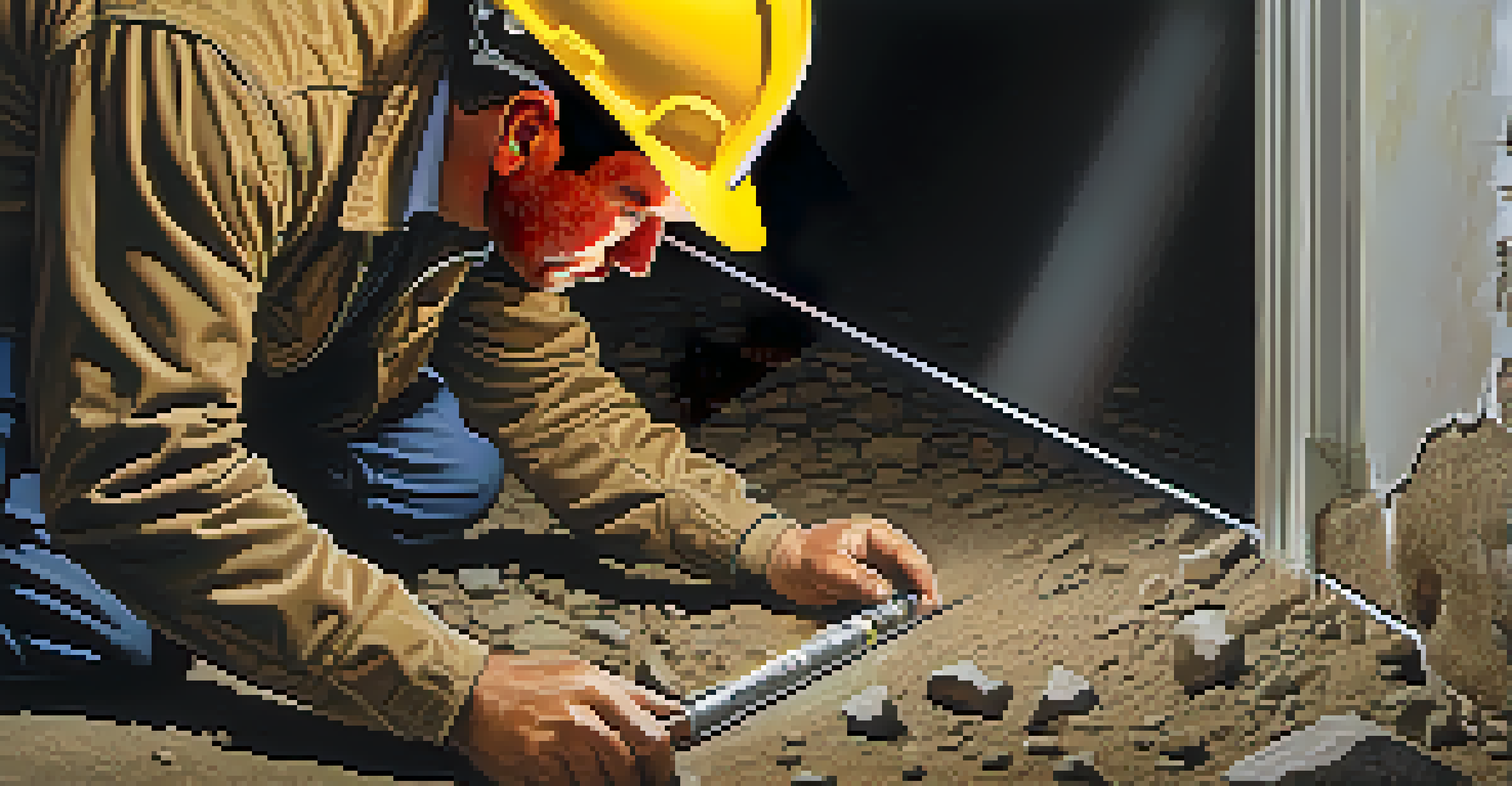How to Handle Unexpected Issues in Home Flipping

Understanding Common Unexpected Issues in Home Flipping
Home flipping can be an exciting venture, but it often comes with unexpected challenges. From structural surprises to hidden mold, these issues can derail your plans. Being aware of common pitfalls helps you prepare better and think on your feet when they arise.
The greatest mistake you can make in life is to be continually fearing you will make one.
For instance, you might start renovations only to discover outdated electrical wiring that needs immediate attention. This not only adds to your budget but also delays your timeline. Recognizing these common issues early can save you significant stress and financial strain down the road.
Ultimately, understanding what can go wrong is the first step in managing your expectations. It's like going on a road trip; knowing there might be detours helps you navigate them more smoothly when they happen.
Prioritizing a Comprehensive Home Inspection
A thorough home inspection is your best ally in the flipping game. It can uncover various issues, from foundation cracks to pest infestations, before you commit to the purchase. Investing in a qualified inspector can help you identify potential problems that could become costly repairs later on.

Think of the inspection as a health check-up for your property. Just as you'd want to know if there are underlying health issues, understanding a home's condition can inform your renovation strategy. This proactive approach can save you time and money in the long run.
Be Prepared for Unexpected Issues
Understanding common challenges in home flipping helps you navigate potential pitfalls more effectively.
By prioritizing a comprehensive inspection, you position yourself to make informed decisions. This means fewer surprises and a smoother journey toward flipping that home for profit.
Building a Flexible Budget for Surprises
Creating a budget is crucial, but flexibility is key when it comes to home flipping. Unexpected costs can pop up at any moment, so setting aside a contingency fund can be a lifesaver. A good rule of thumb is to allocate 10-20% of your total budget for surprises.
Success is not the key to happiness. Happiness is the key to success. If you love what you are doing, you will be successful.
Imagine planning a vacation and forgetting to budget for souvenirs or unexpected experiences. Just as those extras can enhance your trip, having a flexible budget allows you to tackle unforeseen repairs without derailing your entire project. This cushion can keep your flipping venture on track.
In the end, a flexible budget provides peace of mind, allowing you to focus on the creative aspects of flipping rather than stressing over finances.
Creating a Reliable Team of Professionals
Having a reliable team of contractors, inspectors, and real estate agents is essential in home flipping. When issues arise, you want to be able to call on professionals who can provide quick, effective solutions. Building relationships with trustworthy experts can make all the difference.
For example, a dependable contractor can quickly address plumbing issues that could compromise your timeline. Just like a good friend who shows up when you need them most, your team should be there to support you through the unexpected. This collaboration can turn challenges into manageable tasks.
The Importance of a Home Inspection
A thorough inspection can identify costly problems before purchase, allowing for informed renovation decisions.
Ultimately, your team's expertise and reliability can help you navigate those surprises more gracefully. It’s about creating a support network that can adapt to the challenges of flipping.
Maintaining Open Communication with All Parties
Effective communication is vital when dealing with unexpected issues in home flipping. Whether it’s with your contractors or potential buyers, being transparent helps everyone stay on the same page. This can prevent misunderstandings and ensure that everyone is prepared for any surprises.
Think of communication as the glue that holds your project together. When you keep lines open, you can quickly relay changes or updates, which is especially important when unexpected costs arise. This ensures that everyone understands the situation and can adapt accordingly.
In the fast-paced world of home flipping, communication fosters trust and collaboration. It allows you to tackle issues as a united front, making problem-solving much more manageable.
Embracing a Problem-Solving Mindset
Having a problem-solving mindset is crucial in home flipping. Instead of becoming overwhelmed by unforeseen challenges, viewing them as opportunities can shift your perspective. This approach allows you to think creatively and find innovative solutions.
For instance, a major plumbing issue might lead you to consider a new layout for the space. Sometimes, unexpected problems can lead to even better outcomes than you originally planned. Embracing this mindset keeps your energy positive and your project moving forward.
Know When to Walk Away
Recognizing when a project is no longer viable is crucial for long-term success in home flipping.
Ultimately, being adaptable and open-minded turns potential setbacks into stepping stones. This resilience can make your flipping journey not just successful, but also enjoyable.
Documenting Issues and Solutions for Future Reference
Keeping a record of unexpected issues and how you resolved them can be incredibly beneficial. This documentation not only helps you learn from your experiences but also serves as a valuable resource for future projects. It’s like keeping a journal of your flipping journey.
For example, if you encounter a specific type of mold and manage to remediate it successfully, noting the steps and costs involved can guide you in future flips. This creates a treasure trove of knowledge that can save you time and money in the long run.

By documenting your experiences, you build a repository of insights that can enhance your skills as a flipper. Each project becomes a learning opportunity, making you more prepared for whatever surprises may come next.
Knowing When to Walk Away from a Project
Sometimes, the best decision in home flipping is knowing when to walk away. If unforeseen issues are mounting and threaten to exceed your budget or timeline significantly, it may be wise to cut your losses. Understanding your limits is crucial for long-term success.
Think of this as knowing when to fold in a game of poker. Just as a wise player knows when to take a risk and when to walk away, knowing when a project is no longer viable can save you from greater losses. It’s about making strategic choices that benefit your overall flipping career.
Ultimately, walking away from a project doesn’t mean failure; it reflects your ability to make sound business decisions. This knowledge can empower you to focus on more promising opportunities in the future.